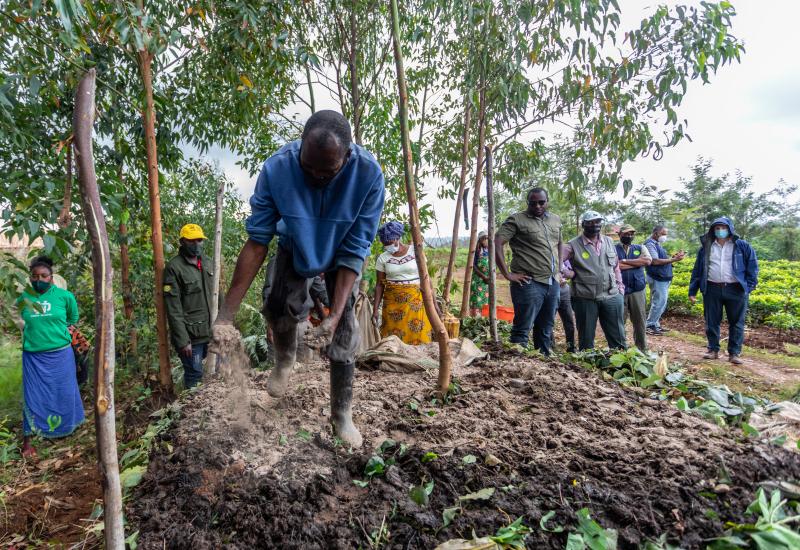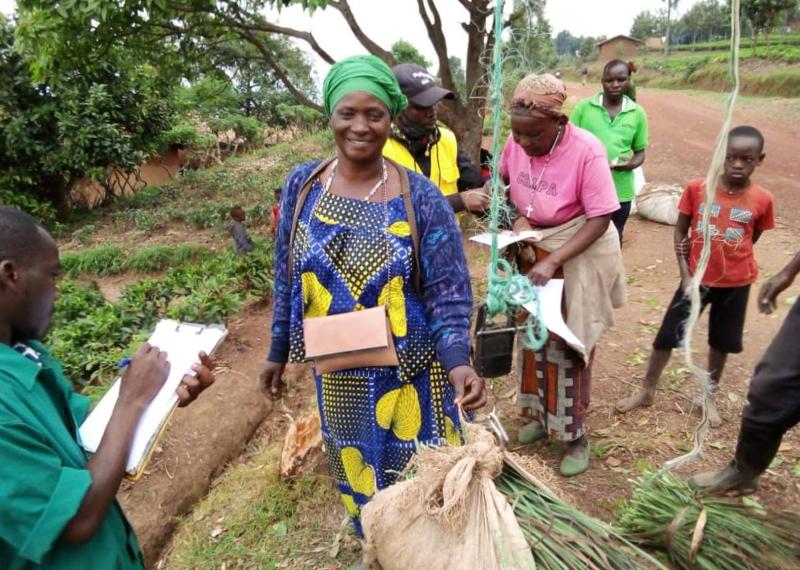At COP27 this year, Vicki Hollub, CEO of Occidental Petroleum, was quite clear in her understanding of who should shoulder the responsibility for addressing climate change: “I’m saying the world is responsible… Don’t ask me about oil and gas without taking some responsibility yourself.”
People will always have differing ideas about who is responsible for what. However, perhaps companies in the tea industry should be asking a different question: “What is our response-ability?”
Questioning “How are we able to respond to the challenges facing us and our partners” is a more fruitful exercise than puzzling over the politics of the situation. In the end, sustainability can take on a new dimension when a business or brand gets past responsibility and thinks about impact instead.
Yogi Tea’s work in Rwanda, for example, provides a case study and inspiration. We’re fortunate to source black tea from Sorwathe, a Rwandan tea plantation founded in 1975. They’re stalwarts of ethical business practices, winning multiple awards for their efforts, and earning a host of third-party certifications, including Rainforest Alliance and Fair Trade.
The black tea we purchase from Sorwathe is also certified organic – a rarity, as barely one percent of global tea production meets organic certification standards. This tea plantation is taking responsibility for sustainability, so it’d be quite easy to simply draft in the wake of their longstanding excellence. However, our response-ability means we can go further together.
At Yogi Tea, we believe regenerative agriculture is the future, and we are pursuing it aggressively. In 2021, we partnered with Sorwathe and Practical Action to launch a regenerative agriculture project. By training farmers in composting, and planting lemongrass amongst the tea bushes at Sorwathe, we hope to preserve topsoil, replenish nutrient levels, and provide an additional income source for farmers, helping to insulate them from fluctuations in the tea market.

(Photo: Courtesy of East West Tea Company)
This project could have been a risky endeavor for farmers without a market for the lemongrass they produce. But we have the response-ability. With our Choice Organics brand already buying their organic black tea, we pledged that Yogi Tea would purchase their lemongrass.
The project is still in its pilot phase, and it hasn’t been entirely smooth sailing, thanks to drought and some seedlings not taking root. Despite these minor setbacks, we remain optimistic, and we could still celebrate a small first harvest of lemongrass in August. Over the long term, these farmers will have a second income source, their soils will be protected, and we will be able to scale up and share lessons learned with other plantations in the region.
Maybe it isn’t our responsibility to get involved, but we’re certain the world is better off for the collective effort.
This hasn’t been our only collaboration. Sorwathe runs an early-life nutrition program, “One Cup of Porridge per Child,” that distributes a specially formulated, nutritionally-fortified porridge called Aheza to smallholder farmers’ children as they go to school. The project earned them the bronze medal at the 2016 North American Tea Conference Sustainability Awards, and is hugely impactful.
In 2020, the opportunity arose to partner with Sorwathe and expand the program, so we did. Every year since, we purchase a year’s worth of Aheza porridge for an additional 200 children, all under the age of two. Earlier this year, we expanded yet again. Our collaboration now provides critical early life nutrition for 2000 Rwandan children – every day, every year.
Asking if we are responsible for the nutrition of smallholder farmers’ children does not increase their well-being. We have the response-ability, and the world is better off – for us, that’s enough.
Indeed, our business relationships give us the opportunity to create real impact, and we’d be remiss to pass up the opportunity.

(Photo: Courtesy of East West Tea Company)
We hope this attitude is infectious. By spreading awareness of what’s happening in Rwanda, the space for response-ability has opened, and we hope that others in global tea industry follow suit.
And while this regenerative project is a pilot, we hope to learn from it, expand its scope and apply its lessons in more locations. In fact, we welcome collaborations with other tea companies, other tea plantations, or anyone with an interest in making the world better off. There’s a lot of work yet to be done. Perhaps you and your tea business will find a similar path.
In the end, we as tea leaders can get stuck debating who is responsible, or we can joyfully engage with how we are response-able.
John Broadway is the sustainability communications specialist for East West Tea Company, parent company of Yogi Tea and Choice Organics. Based in Malmӧ, Sweden, his role manages the compiling, analyzing, and retelling of the company’s sustainability stories, directing audience-appropriate narratives to marketing, sales, internal and external channels. An active academic and researcher, his work has been published in journals including Gastronomica, and he has completed business writing projects for clients including Chase Bank and Charles Schwab. East West Tea Company manages the Yogi Tea and Choice Organics tea brands, and stands for passion, sustainability, and conscious living. By building a community around well-being, EWTC inspires and enhances everyday life with only the highest quality natural and organic ingredients. To learn more, visit YogiProducts.com and ChoiceOrganicsProducts.com.
Plan to Attend or Participate in the
World Tea Conference + Expo, March 27-29, 2023
To learn about other key developments, trends, issues, hot topics and products within the global tea community, plan to attend the World Tea Conference + Expo, March 27-29, 2023 in Las Vegas, co-located with Bar & Restaurant Expo. Visit WorldTeaExpo.com.
To book your sponsorship or exhibit space at the World Tea Conference + Expo, or to enquire about advertising and sponsorship opportunities at World Tea News, contact:
Ellainy Karaboitis-Christopoulos
Business Development Manager, Questex
Phone: +1-212-895-8493
Email: [email protected]
Also, be sure to stay connected with the World Tea Conference + Expo on social media for details and insights about the event. Follow us on Twitter, Facebook, Instagram and LinkedIn.
